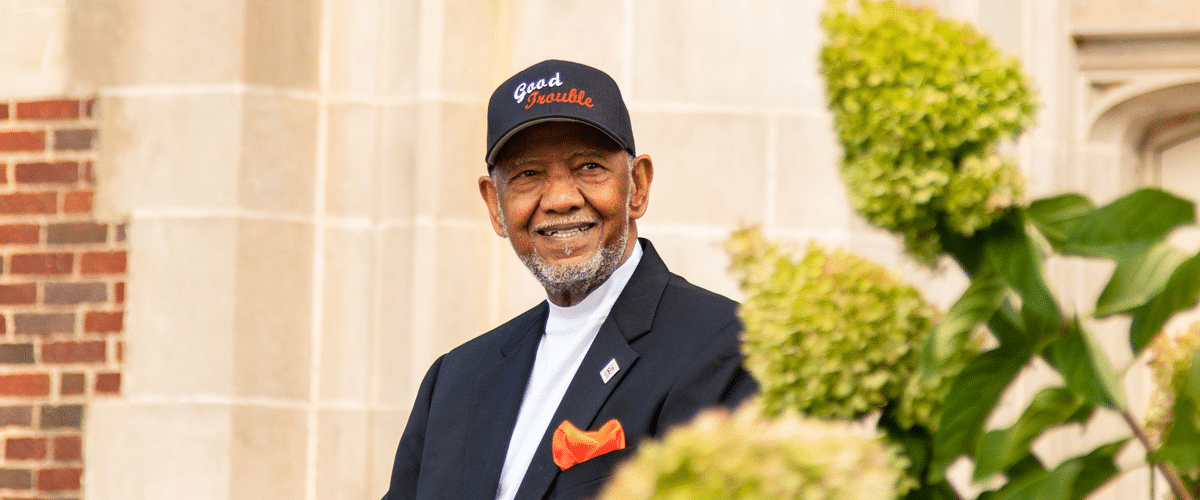
The world has changed significantly since Theotis Robinson Jr. made history in 1961 as one of the first African American students to enroll as an undergraduate at the University of Tennessee. He committed to make the world a better place continuously.
Robinson recently established the Theotis Robinson Jr. Flagship Pathway Scholarship Endowment to support students who have graduated from one of 38 designated Flagship high schools throughout the state and are entering the university as first-year students.
“As years have gone by, and I have visited and worked on campus, I would see Black students— especially undergraduate students—and thought about the doors of opportunity that have been opened to them,” Robinson said. “Now they are attending, studying, and earning degrees. In my time, we were conscious of the social change of being able to attend UT for the first time, but current students never had that experience because they never had the door closed against them.”
Robinson’s career was in public life, serving on the Knoxville City Council from 1970 to 1978 and as vice president of economic development for the 1982 World’s Fair. He worked at UT from 1989 until his retirement in 2014, ultimately being named vice president for equity and diversity some 40 years after his historic enrollment.
The Theotis Robinson Jr. Flagship Pathway Scholarship Endowment
It just struck me that I wanted to do something lasting and provide opportunities for students to attend the university.
– Theotis Robinson Jr.
“It just struck me that I wanted to do something lasting and provide opportunities for students to attend the university,” Robinson said. “That was my frame of mind when I spoke with my wife and family about the matter, and we decided to establish a scholarship to assist students seeking a new pathway to a future with opportunities.”
Robinson’s connection to UT began through sports. His father was a cook when Robinson was in elementary school, preparing food for athletes at the “training table.” It was under the east stands of Neyland Stadium, which at the time was still a horseshoe shape with no upper deck. Robinson remembers watching games from Section X, where Black people were required to sit.
Robinson attended Austin High, which was the only high school in Knoxville for Black students. He joined an attempt to enroll at another high school for white students only, which led to a lawsuit. From there, Robinson attempted to enroll at UT, where his application was denied based on race. In a meeting with then-President Andy Holt, he stated his intention to sue unless admitted. The UT Board of Trustees changed its policy and desegregated.
Robinson participated in the 1960 lunch counter sit-ins, which were less violent in Knoxville than in other cities throughout the South. A newspaper ad that cited numerous racial injustices in Knoxville, including UT not accepting Black undergraduate students, had prompted him to apply for admission. As a UT student, he participated in stand-in demonstrations at downtown movie theaters.
“John Duncan was the mayor at the time, and he thought the matter could be resolved without some of the strife we witnessed in other places,” Robinson said. “Police were assigned to keep the peace, but, nevertheless, there was a lot of tension at the lunch counters, and some violence did occur because I saw demonstrators being attacked.”

At the time, Knoxville had four hospitals, and only the UT Medical Center, which was the only one not affiliated with a Christian denomination, admitted Black patients. Even there, African Americans had to use a separate floor with just 25 beds. Robinson pointed out the changes that happened were primarily due to the political activity of youth activists.
“We brought energy to the whole political dynamic in the country,” Robinson said. “Our nation needs more of that today. We don’t need old stodgy men deciding everything for everybody, with stale ideas or no ideas, and just grasping for power.”
Times have changed, Robinson added, and the outlook for Black students at UT is entirely different. He mentioned an example of a relative who has entered the university with plans to major in finance.
“To major in finance would never have occurred to me,” Robinson said. “He has more expanded horizons than I did.”
And then he added with a gentle chuckle: “If it had occurred to me, I would also have taken an MBA and a law degree and headed straight to Wall Street.”
